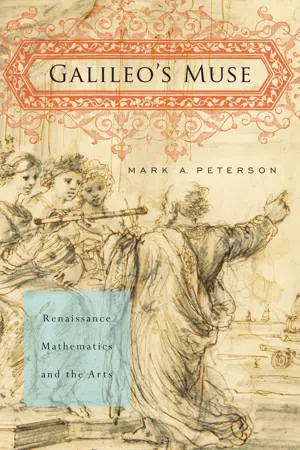
- English
- PDF
- Available on iOS & Android
About this book
Mark Peterson makes an extraordinary claim in this fascinating book focused around the life and thought of Galileo: it was the mathematics of Renaissance arts, not Renaissance sciences, that became modern science. Galileo's Muse argues that painters, poets, musicians, and architects brought about a scientific revolution that eluded the philosopher-scientists of the day, steeped as they were in a medieval cosmos and its underlying philosophy.
According to Peterson, the recovery of classical science owes much to the Renaissance artists who first turned to Greek sources for inspiration and instruction. Chapters devoted to their insights into mathematics, ranging from perspective in painting to tuning in music, are interspersed with chapters about Galileo's own life and work. Himself an artist turned scientist and an avid student of Hellenistic culture, Galileo pulled together the many threads of his artistic and classical education in designing unprecedented experiments to unlock the secrets of nature.
In the last chapter, Peterson draws our attention to the Oratio de Mathematicae laudibus of 1627, delivered by one of Galileo's students. This document, Peterson argues, was penned in part by Galileo himself, as an expression of his understanding of the universality of mathematics in art and nature. It is "entirely Galilean in so many details that even if it is derivative, it must represent his thought," Peterson writes. An intellectual adventure, Galileo's Muse offers surprising ideas that will capture the imagination of anyone—scientist, mathematician, history buff, lover of literature, or artist—who cares about the humanistic roots of modern science.
Frequently asked questions
- Essential is ideal for learners and professionals who enjoy exploring a wide range of subjects. Access the Essential Library with 800,000+ trusted titles and best-sellers across business, personal growth, and the humanities. Includes unlimited reading time and Standard Read Aloud voice.
- Complete: Perfect for advanced learners and researchers needing full, unrestricted access. Unlock 1.4M+ books across hundreds of subjects, including academic and specialized titles. The Complete Plan also includes advanced features like Premium Read Aloud and Research Assistant.
Please note we cannot support devices running on iOS 13 and Android 7 or earlier. Learn more about using the app.
Information
Table of contents
- Contents
- Prologue
- 1. Galileo, Humanist
- 2. The Classical Legacy
- Poetry
- Painting
- Music
- Architecture
- Epilogue
- Notes
- Acknowledgments
- Index